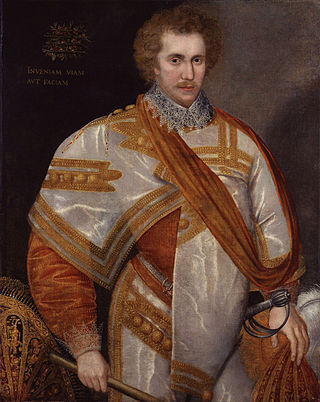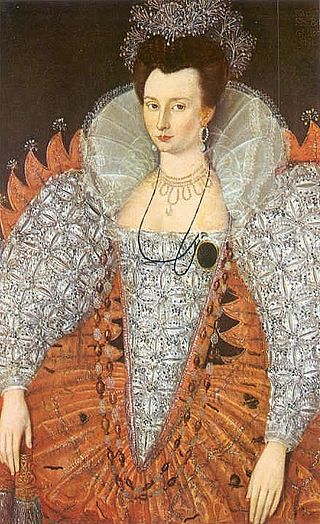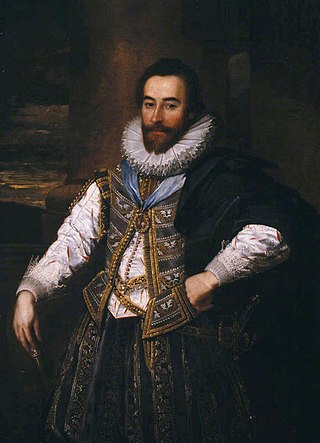
Edward de Vere, 17th Earl of Oxford, was an English peer and courtier of the Elizabethan era. Oxford was heir to the second oldest earldom in the kingdom, a court favourite for a time, a sought-after patron of the arts, and noted by his contemporaries as a lyric poet and court playwright, but his volatile temperament precluded him from attaining any courtly or governmental responsibility and contributed to the dissipation of his estate.

Robert Sidney, 1st Earl of Leicester, was an English courtier, soldier, and landowner. He was chamberlain to Anne of Denmark.

Henry Wriothesley, Lord of Southampton, was the only son of Henry Wriothesley, 2nd Earl of Southampton, and Mary Browne, daughter of Anthony Browne, 1st Viscount Montagu. Shakespeare's two narrative poems, Venus and Adonis and The Rape of Lucrece, were dedicated to Southampton, who is frequently identified as the Fair Youth of Shakespeare's Sonnets.

Mary Fitton was an Elizabethan gentlewoman who became a maid of honour to Queen Elizabeth. She is noted for her scandalous affairs with William Herbert, 3rd Earl of Pembroke, Vice-Admiral Sir Richard Leveson, and others. She is considered by some to be the "Dark Lady" of Shakespeare's sonnets.

George Carew, 1st Earl of Totnes, known as Sir George Carew between 1586 and 1605 and as The Lord Carew between 1605 and 1626, served under Elizabeth I during the Tudor conquest of Ireland and was appointed President of Munster. He was an authority on heraldry and the author of Carew's Scroll of Arms 1588, Collected from Churches in Devonshire etc., with Additions from Joseph Holland's Collection of Arms 1579.
Mary Herbert, Countess of Pembroke was the wife of William Herbert, 3rd Earl of Pembroke.

Robert Sidney, 2nd Earl of Leicester was an English diplomat and politician who sat in the House of Commons between 1614 and 1625 and then succeeded to the peerage as Earl of Leicester.

Sir Thomas Coningsby was an English soldier and Member of Parliament, notable for his diary of military action in France in 1591, and his feuds over local representation in Herefordshire.
Sir William Temple was an English Ramist logician who served as the 4th Provost of Trinity College Dublin from 1609 to 1627. He also served as a member of the Irish House of Commons representing the Dublin University constituency from 1613 to 1627.
Katherine Hastings, Countess of Huntingdon was an English noblewoman.
Sir Robert Southwell (1563–1598), of Woodrising, Norfolk, was an English politician.

Frances Howard, Countess of Kildare, was a courtier and governess of Princess Elizabeth Stuart, Queen of Bohemia, and a member of the House of Howard.

Elizabeth Howard (1564—1646) was an English aristocrat and courtier to Elizabeth I of England.

Sarah Harington (1565–1629) was an English courtier.
Dorothy Hastings was a courtier to Elizabeth I of England and Anne of Denmark
Mabel Harington, was a courtier to Elizabeth I of England and the sixth daughter of Sir James Harington and Lucy Harington, the daughter of Sir William Sidney of Penshurst, Kent. She married Sir Andrew Noel of Dalby and Brooke, having 7 children. Later dying in 1603.
Margaret Ratcliffe or Radcliffe or Radclyffe (1575-1599) was an English courtier.

Elizabeth Southwell (1584–1631) was an English courtier who lived in Florence.
Cordell Annesley was an English courtier.
Elizabeth Moleyns was an English courtier.